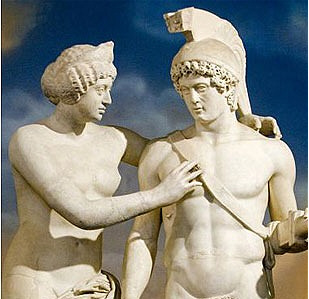Peace and Safety for Your Twentieth of June: On the Futility of “Argument”
Peace and Safety to the Epicureans of today, no matter where you might be!
As progress continues to be made on the updated discussion forum for Epicurean ideas at Facebook, I continue to think about the proper means of discussing matters with frankness without disagreeableness. There are two passages from Frances Wright’s “A Few Days In Athens” that make this point particularly well, and I think are fully consistent with the Epicurean texts.
The first is a discussion by Leontium with Epicurus about her reading of Theophrastus, the successor to Aristotle in the Peripatetic school. The following appears in Chapter Two:
“I know not,” resumed Leontium, “that I should this evening have so frequently thought Theophrastus wrong, if he had not made me so continually feel that he thought himself right. Must I seek the cause of this in the writer’s or the reader’s vanity?”
“Perhaps,” said the master, smiling, ” you will find that it lies in both.”
“I believe you have it,” returned Leontium. “Theophrastus, in betraying his self-love, hurt mine. He who is about to prove that his own way of thinking is right, must bear in mind, that he is about also to prove that all other ways of thinking are wrong. And if this should make him slow to enter on the undertaking, it should make him yet more careful, when he does enter on it, to do it with becoming modesty. We are surely imperiously called upon to make a sacrifice of our own vanity, before we call upon others to make a sacrifice of theirs. But I would not particularize Theophrastus for sometimes forgetting this, as I have never known but one who always remembers it. Gentleness and modesty are qualities at once the most indispensable to a teacher, and the most rarely possessed by him. It was these that won the ears of the Athenian youth to Socrates, and it is these,” inclining to the master, “that will secure them to Epicurus.”“Could I accept your praise, my daughter, I should have no doubt of the truth of your prophecy. For, indeed, the mode of delivering a truth makes, for the most part, as much impression on the mind of the listener, as the truth itself. It is as hard to receive the words of wisdom from the ungentle, as it is to love, or even to recognize, virtue in the austere.”
Discussion returns to a similar theme later in the book, when Theon reports to Epicurus that he has argued with Cleanthes the night before. The following is from Chapter Eight:
[Theon]: ….I passed the evening at my own lodgings, with my friend Cleanthes.”
[Epicurus]: “Trying to talk him into good humor and charity, was it?”“Something so.”
“And you succeeded ?”
“Verily, I don’t know; he did not leave me in worse humor than he came.”
“Nay, then it must have been in better. Explanation always approaches or widens the differences between friends.”
“Yes, but we also entered into argument.”
“Dangerous ground that, to be sure. And your fight, of course, ended in a drawn battle.”
“You pay me more than a merited compliment, in concluding that to be a thing of course.”
“Nay, your pardon! I pay you any thing but a compliment. It is not that I conclude your rhetoric and your logic equal, but your obstinacy and your vanity.”
“Do you know, I don’t think myself either obstinate or vain,” said Theon, smiling.
“Had I supposed you did, I might not have seen occasion to give you the information.”
“But on what grounds do you think me obstinate and vain?”
“Your years; your years. And do you think there is a man under twenty that is not both?”
“Why, I should think an old man, at least, more obstinate than a young one.”
“I grant you, when he is obstinate, which is pretty often, but not quite always; and when he is vain, the same. But whilst many old men have vanity and obstinacy in the superlative degree, all young men have those qualities in the positive. I believe your share to be tolerably moderate, but do not suppose that you have no share at all. Well, and now tell me, was it not a drawn battle?”
“I confess it was. At least, we neither of us convinced the other.”
“My son, it would have added one more to the seven wonders if you had. I incline to doubt, if two men, in the course of an olympiad, enter on an argument from the honest and single desire of coming at the truth, or if, in the course of a century, one man comes from an argument convinced by his opponent.”
These are excellent passages to consider before engaging in any “argument.” For more on the Epicuruean view of “frank criticism,” see this post, which contains a link to a passage from Philodemus.
Peace and safety to you all!
_________________
As Seneca recorded: Sic fac omnia tamquam spectet Epicurus! So do all things as though watching were Epicurus!
And as Philodemus wrote: “I will be faithful to Epicurus, according to whom it has been my choice to live.“ughts and topics, and I commend his entire article to you so that you can yourself not simply defer to Epirucus, but reason the issue through to you own conclusion.

